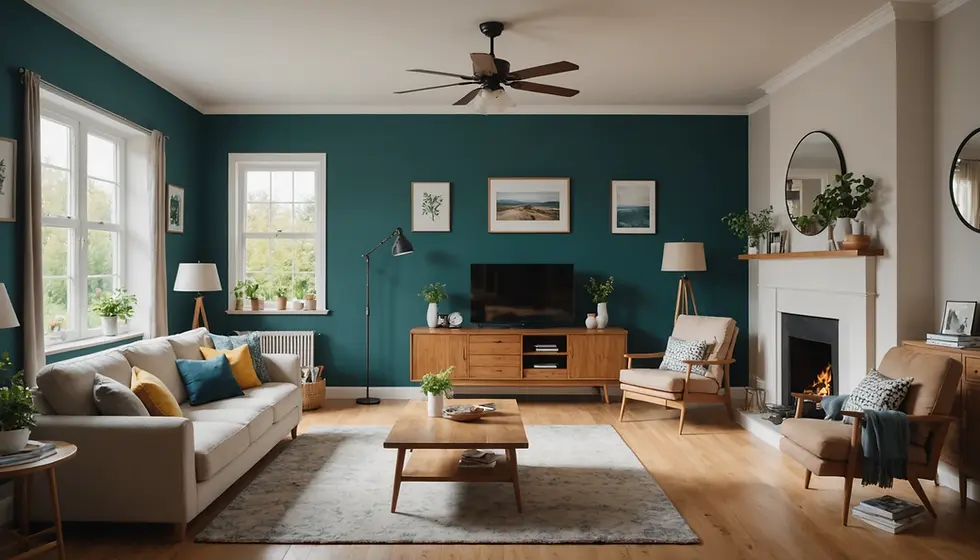Balancing Budgets and Aesthetics: The Unknown Path to Economy Interior Design Planning and Design
- SILA

- Jan 27, 2025
- 3 min read
Creating a beautiful and inviting space on a budget can often feel like a delicate juggle. This challenge becomes more exhilarating when you discover that stylish design can coexist with financial limits. In this post, we will explore effective strategies for economy interior design, providing actionable tips and real-world examples to help you seamlessly balance your budget with your aesthetic aspirations.
Understanding Economy Interior Design
Economy interior design focuses on crafting visually appealing spaces without overspending. It requires strategic planning on materials, colors, furniture, and other design elements to make the most of your limited budget. The goal is to achieve a cohesive look while being mindful of expenses.
Choosing high-quality, cost-efficient materials is crucial. For example, consider using laminate flooring, which can cost around 50% less than hardwood while still providing a stylish appearance. Additionally, look for versatile furniture like an ottoman that can serve both as a seat and as storage, maximizing functionality in smaller areas.
Smart Budgeting Techniques
Before diving into design decisions, it’s essential to set a clear budget. Start by evaluating your finances and determine how much you can allocate for decorating.
Setting Priorities
Identify which elements are most important to you. If comfort is a top priority, investing in a quality sofa may be more important than spending on decorative pillows. Consider allocating about 40% of your budget to essential furniture and about 20% for decorative items.
DIY vs. Professional Help
Think about which projects you can handle yourself. Simple tasks like painting a wall or refinishing a piece of furniture can save you a great deal. For example, painting a room can cost around $300 compared to hiring a professional painter, which can run upwards of $1,500. However, some complexities, like extensive renovations, may warrant professional assistance.
Creative Design Strategies
Budget-friendly design doesn't mean sacrificing style. With creativity, you can develop a captivating design that reflects your tastes while being economical.
Embrace Minimalism
Minimalism emphasizes clean lines and fewer items but with strong visual impact. Instead of cluttering a room with numerous decorations, choose a few meaningful pieces. A well-placed large piece of artwork can serve as a focal point, transforming a simple space into a sophisticated one.
Color Palettes and Textures
A strong color palette can dramatically affect a room’s feel. For instance, painting a small space in light colors can give the illusion of a larger area, while darker colors can add coziness. Additionally, mixing different textures—such as a soft throw on a leather sofa—can enhance visual interest without considerable expense.
Upcycling and Repurposing
Upcycling is a fantastic way to infuse character into your space. For instance, an old wooden ladder can be transformed into a unique bookshelf with just a coat of paint and some sanding. This not only breathes new life into an old item but also saves you money.
Sourcing Affordable Décor
Finding affordable décor is key to completing your design. Here are a couple of effective strategies:
Thrift Shopping and Flea Markets
Local thrift shops and flea markets are treasure troves for unique items at budget-friendly prices. For example, you might find a vintage lamp for under $20 that can add character and warmth to your room. These items often come with histories and quirks that can add charm to your space.
Online Marketplaces
Websites specializing in second-hand items can yield significant savings. For instance, platforms like Facebook Marketplace can allow you to find quality furniture at discounts of 30%-70%. Just remember to verify the condition of items and factor in any potential shipping costs.
The Importance of Lighting
Good lighting can transform any space from ordinary to extraordinary. Here's how to maximize your lighting:
Natural Light: Keep windows unobstructed to allow as much natural light in as possible. Light, sheer curtains can soften the sunlight, creating a warm atmosphere.
Layered Lighting: Use a mix of ambient, task, and decorative lighting. For instance, installing wall sconces can enhance your room’s depth and atmosphere without significant costs.
DIY Lighting Solutions: Create your own fixtures using inexpensive materials. A hand-painted pendant lamp can dramatically change the ambiance while serving as an attractive focal point.
Crafting Your Personal Space
Finding the balance between budget constraints and attractive aesthetics is an art form that promotes individuality and creativity. By planning wisely, using innovative design strategies, and being resourceful in sourcing items, you can craft a beautiful space that resonates with your personal style—without straining your finances.
While the journey may require effort and planning, the result will be a well-designed, inviting home tailored just for you. So gather your ideas, roll up your sleeves, and embark on the exciting journey of economy interior design.




Comments